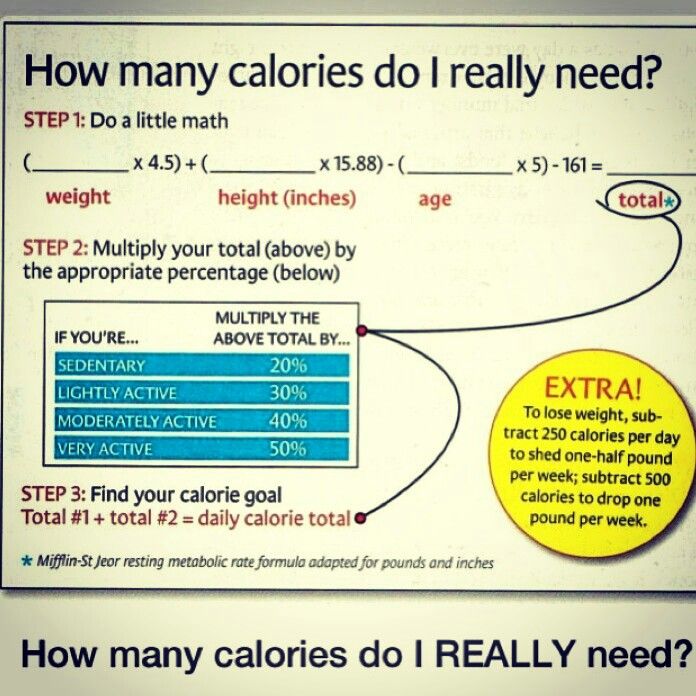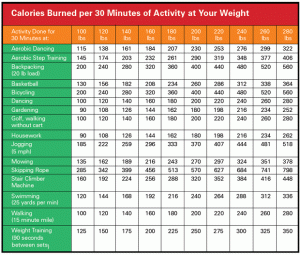How Many Calories Do I Need Per Day
Control Calories to Maintain, Gain or Lose Weight
Just how many calories should you eat per day? This is a great question and to answer this question, it will vary from person to person. Each person will have a different body make up and activity level besides age, gender, height, and weight. These factors play an important role to determine just how many calories you need per day.
The average woman needs about 2000 calories a day to maintain their weight and 1500 calories a day to lose one pound of weight per week. An average man needs about 2500 calories a day to maintain their weight and 2000 calories to lose one pound of weight per week.
The actual amount of calories your body needs will depend upon your age, gender, height, and daily activity level. Since, every person is unique, it is best to use the following calculator to assist you in determining the actual calories you need for your age, height, gender and activity.
How many calories should I eat includes…
- What is a calorie
- How to calculate your calories to maintain existing weight
- Activity level
- Vitamins and minerals
- Gluten free dieters
What Is A Calorie
A calorie is a unit that measures energy. Calories are usually used to measure the energy content of foods and beverages. In order to lose weight, you need to eat fewer calories than your body burns each day. One pound of body weight is equal to approximately 3500 calories. Reducing your intake of calories by 500 a day will equal 3500 calories at the end of one week, and you will lose one pound of body weight.
The reverse is true if you want to increase your body weight. Consume an extra 500 calories per day for seven days, and you will gain one pound of body weight.
How To Calculate Your Calories To Maintain Existing Weight
The first step in this process is knowing your BMR or Basal Metabolic Rate. This equals the amount of calories needed per day just to keep your body functioning properly.
The formula to calculate your basal metabolic rate is as follows;
Women:
655 + (4.3 x weight in pounds) + (4.7 x height in inches) – (4.7 x age in years) = BMR
Men:
66 + (6.3 x weight in pounds) + (12.9 x height in inches) – (6.8 x age in years) = BMR
The above formulas only applies to adults.
The result is the total number of calories needed for your body to function without any exercise or eating.
For example, a male who is 25 and weighs 180 lbs. and has a height of 70 inches, their BMR is 6.3 x 180 = 1134 + 66 or 1200 + (12.9 x 70 = 903) 903 + 1200 = 2103 minus 6.8 x 25 = 170. 2103 – 170 = 1933. The BMR for this individual is 1933 calories per day just to maintain their body function.
Activity Level
The next step is to know your activity level and with this number add the BMR to equal the total number of calories needed to maintain your present weight.
To calculate the activity level, refer to the information below and multiply it by the BMR:
- 1.2 – Low intensity activities (primarily sedentary)
- 1.375 – Light intensity activities (leisurely walking 30-50 minutes, house chores, golfing)
- 1.55 – Moderate exercise 3 to 5 days 60%-70% MHR for 30-60 minutes
- 1.75 – Active activities exercising 6-7 days per week for 45-60 minutes
- 1.9 – Extremely active heavy manual labor, heavy lifting, endurance athletes 90 minutes
Find your activity level from above and multiply the BMR with the appropriate number.
For example, if your BMR is 1933, and your activity level is light intensity multiply 1933 x 1.375 = 2658. This would be the total number of calories to maintain your present weight. To lose a pound of weight per week you would reduce the caloric intake by 500 which would be 2158. To gain one pound per week you would increase the caloric intake to 3158.
Below is a website that has a calculator which will help you to determine your BMR, and the calories needed for no weight gain. It also provides information on the number of calories needed to gain or lose weight as well.
http://www.calculator.net/calorie-calculator.html
However, if your objective is to lose weight, just reduce your caloric intake by 500 calories per day as stated before. A loss of 3500 calories per week will reduce your weight by 1 pound. The reverse is true if you want to gain weight. Just increase your caloric intake by 500 calories per day.
Note: Whether you want to lose or gain weight, you need to do it slowly 500 calories per day. Increasing or decreasing your weight by calories above 500 may cause health issues later. Do it only upon the recommendation of your doctor.
Vitamins and Minerals
It is important that when you are on a diet to lose, gain or maintain your weight, be sure to ingest the fiber, protein, vitamins and minerals required for your age, gender, height and weight, on a daily basis. These nutritional needs will not change or go away. You will need them to have good health during this weight gain, maintain or loss program.
If you exercise more you can eat more as long as you meet the 500 calorie a day deficit to lose one pound of weight per week.
Here is a website (http://fnic.nal.usda.gov/fnic/interactiveDRI/) where you enter information in a calculator to determine what these nutritional values are specifically for you. This calculator will provide; BMI, Macronutrients, Vitamins, and Minerals needed for your daily requirements. It will also include the calories needed to maintain your present weight. This is known as DRI (Dietary Reference Intake). Check out this calculator by clicking on the link.
Gluten Free Dieters
If you are allergic to gluten or have celiac disease, you will need to adjust the foods being ingested but also meet the DRI requirements for your age and gender. Use the above
calculators to assist you in determining your daily requirements for fiber, protein, vitamins and minerals. These are important to insure your good health while eating gluten free foods.
You can also use these calculators to assist you if you need to lose or gain weight.
Remember, the DRI is the basic amount of calories needed daily just to maintain your present weight. To gain weight, one pound per week, increase the caloric intake by 500 calories per day. To lose weight, 1 pound per week, reduce the daily caloric intake by 500 calories. 3500 calories is the equivalent of 1 pound of weight.
Video
Below is an excellent video of how to calculate your basic calories for your gender and age. Take a look!
To assist you in tracking your calories, fat and carbs here is a link My Fitness Pal where you can download an app to your device or computer to use daily. It will help track the calories, fat, and carbs being consumed in the foods you eat. It even tracks this data for restaurant entrees. If you are serious in losing weight, this app is for you.
View the video above for more information on how this app works.
It’s free and you just sign-up using Facebook or email. That’s it.
Conclusion
From the information presented you can maintain, lose or gain weight. It all depends upon you eating the proper foods and not exceeding the required amount of calories per day for your age, gender, height, and weight. Knowing your BMR should provide you with a blueprint for your weight loss, weight gain schedule or maintaining existing weight. Another factor is the activity level you have. Don’t forget, if your activity level changes, be sure to adjust your BMR calories too.
Remember, the amount of calories required daily will vary for each individual. Make adjustments as necessary to reach your goal whether to maintain, gain or lose weight.
One final reminder, don’t forget to eat the proper amounts of fiber, protein, vitamins and minerals for your age and gender. When you are on a diet to gain or lose weight, eating the proper amounts of these nutrients is vital for good health.
Also, adding or reducing your calories by amounts greater than 500 can cause the body some health issues over time. Stick with the slow and steady goal of 500 calories per day. You will be glad you did.
Go back to the Gluten Free Diet With Nutrition home page.

